The AVAC Fellows program empowers advocates to create lasting impact within their communities and beyond. Alumni often pursue further training, lead advocacy movements, and play significant roles in shaping health policies and national strategies.
AVAC Fellows Program
Our Work with Key Populations
AVAC advocates for effective HIV prevention, supports Key Population-led research participation, fights against criminalization policies, accelerates access to innovative prevention tools, and champions broader health equity issues.
Avac Event
Just What is Discovery Medicine? And What Does it Mean for HIV Vaccine Research?
Participants joined to gain a broad understanding of Discovery Medicine including an overview of the current landscape for HIV vaccines. We also discussed what it means for HIV vaccine research and development moving forward, with a focus on community and advocacy priorities.
Speakers:
- Dr. Betty Mwesigwa, Makerere University Walter Reed Project
- Tian Johnson, BRILLIANT HIV Vaccine Discovery Consortium
- Dr. Cathy Slack, HIV AIDS Vaccines Ethics Group
- Dr. Sandhya Vasan, Henry M. Jackson Foundation for the Advancement of Military Medicine, US Military HIV Research Program
Moderators:
- Stacey Hannah, AVAC
- Louis Shackelford, HIV Vaccine Trials Network (HVTN) & COVID-19 Prevention Network (CoVPN)
Recording / Full Slides / Resources
Introducing Advocacy Chronicles: A new AVAC podcast takes you behind the scenes with leading advocates
AVAC is thrilled to announce our new PxPulse podcast series, The Advocacy Chronicles, featuring conversations with leading advocates who take us behind the scenes on critical issues at the forefront of global health equity. In each concise conversation, a leading advocacy champion will talk about a priority community issue they identified, the tactics they used to address it, and the wins and outcomes they achieved.
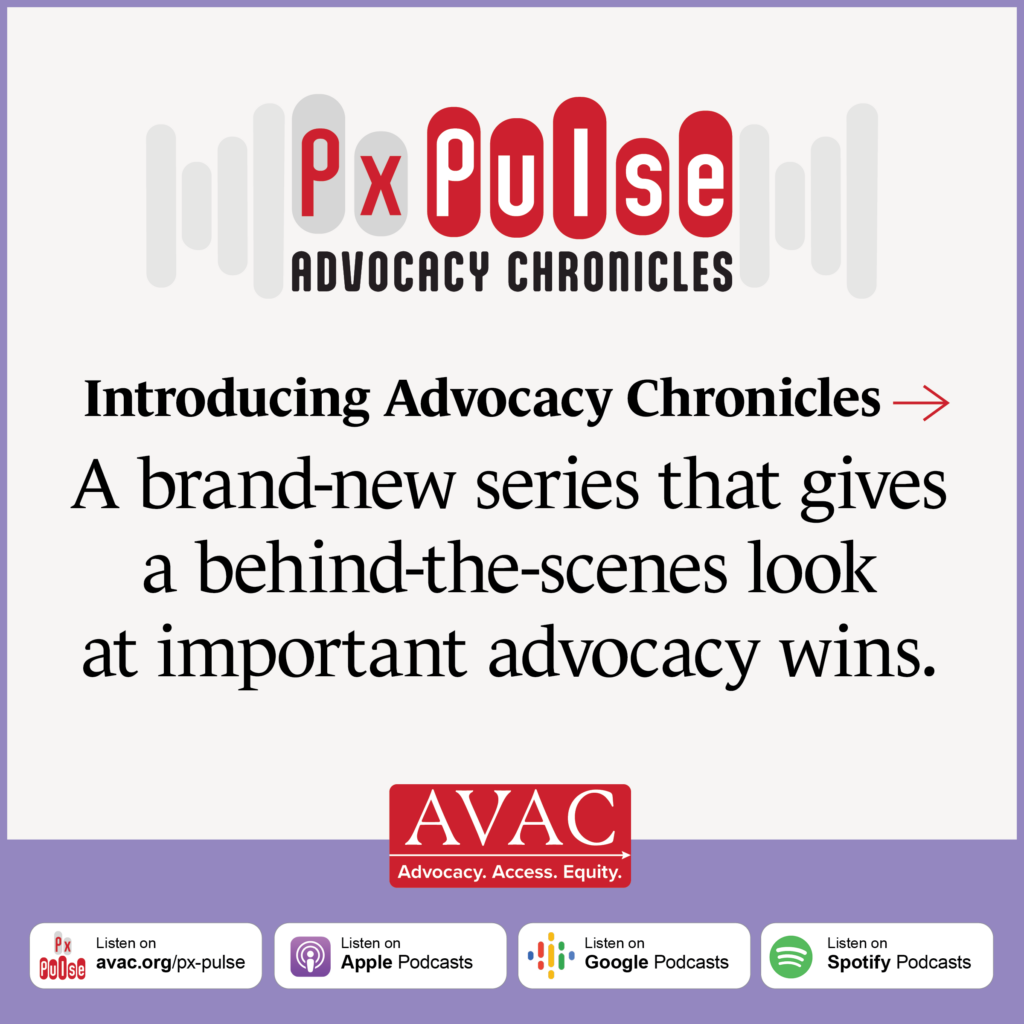
Our debut episode of PxPulse: The Advocacy Chronicles is with Yvette Raphael, the Executive Director of Advocacy for Prevention of HIV and AIDS (APHA), and one of South Africa’s leading human rights activists. Yvette co-chairs the African Women Prevention Community Accountability Board (AWPCAB), which launched The HIV Prevention Choice Manifesto in September 2023. Yvette discusses the manifesto – a global call, developed and implemented through support from the CASPR project, for increased political and financial commitment to ensure every proven method of HIV prevention is integrated into the HIV response. She lays out why The Choice Manifesto matters, how advocates are leveraging it, and what tactics will advance its priorities.
Find the full episode here. Follow The Advocacy Chronicles on PxPulse to hear about the issues that advocates are taking on to advance HIV prevention and what they are learning in the process. Upcoming episodes will feature champions behind campaigns to decriminalize sex work; new advocate-created platforms for ongoing engagement between government and young women; successful efforts to set targets and secure funding from PEPFAR; advocacy to challenge anti-gay hate laws and protect communities of key populations, and more!
Subscribe on Apple Podcasts to catch every episode!
Save the Date!
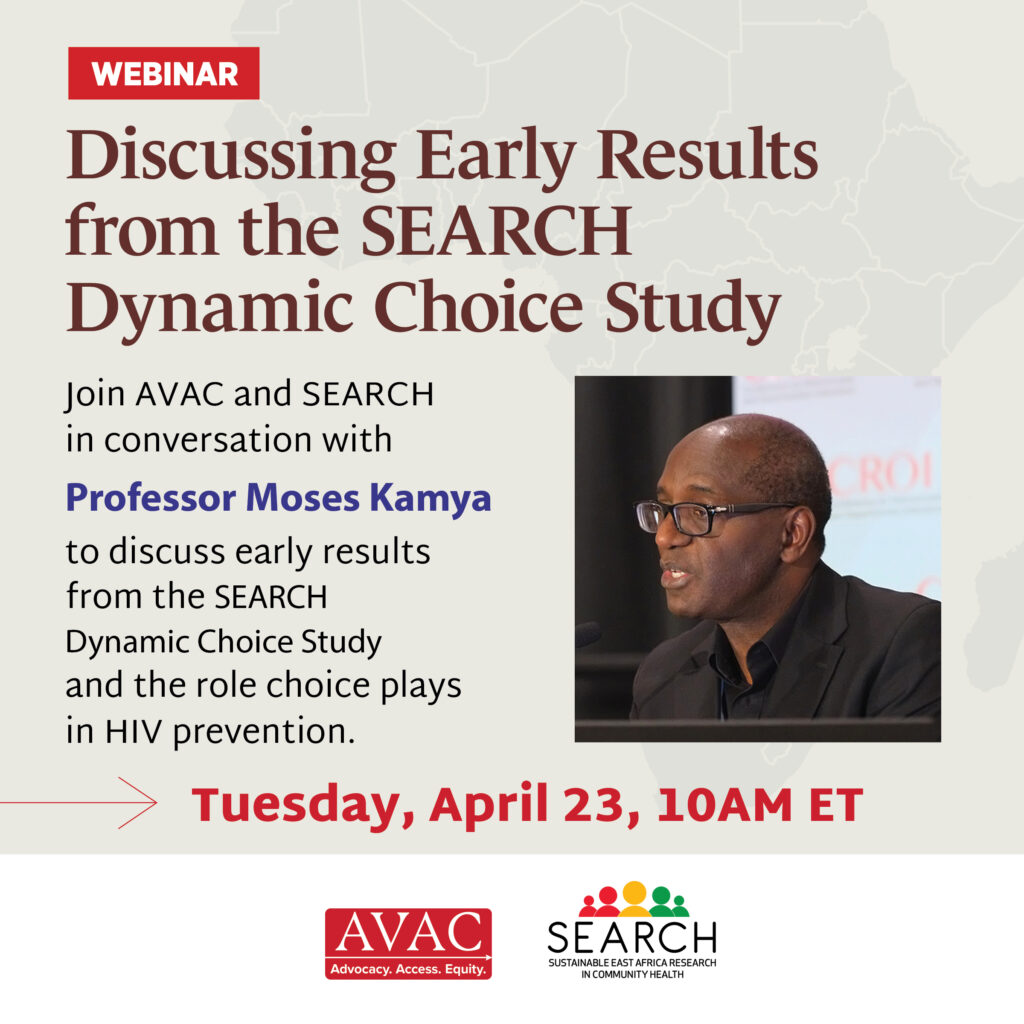
Discussing Early Results from the SEARCH Dynamic Choice Study
Join AVAC and SEARCH in conversation with Professor Moses Kamya of Makerere University to find out why the early results of the SEARCH Dynamic Choice study were some of the most exciting news to come out of the CROI meeting in 2024. The webinar will consist of a presentation by Professor Kamya, followed by a robust discussion about the role of choice in HIV prevention.
Avac Event
PrEP and the Role of HIV Self-Testing
HIV self-testing (HIVST) is a safe, accurate, and effective alternative to provider-administered testing that many users prefer for its convenience and confidentiality. At IAS 2023, WHO issued a new recommendation to offer HIVST for PrEP initiation and continuation as an innovative way to increase PrEP access and coverage and further simplify PrEP delivery. However, many implementers still have questions on how to effectively roll out and scale up this important self-care intervention.
On May 23, AVAC and WHO hosted a webinar to learn more about WHO guidance on use of HIVST and to hear directly from a panel of experts on their experiencing rolling out HIVST for PrEP, guidance on procurement and costing, and more.
Recording / Slides
PxPulse: The Advocacy Chronicles with APHA’s Yvette Raphael
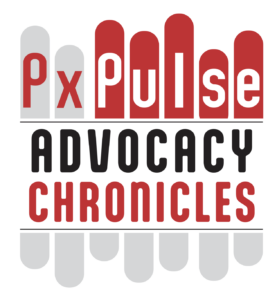
Our debut episode of the Advocacy Chronicles features Yvette Raphael, the Executive Director of Advocacy for Prevention of HIV and AIDS (APHA) in South Africa, and a leader in the development of The Choice Manifesto, supported from start to finish by CASPR.
As co-chair of the African Women Prevention Community Accountability Board (AWPCAB), Yvette and other board members launched the manifesto in Kampala, in September 2023, calling for choice in HIV prevention options for women — such as oral and injectable cabotegravir for PrEP, the dapivirine vaginal ring and the Dual Prevention Pill — and a commitment to expanding access to them. A call heard by UNAIDS Executive Director Winnie Byanyima, who was on hand at the launch to endorse the manifesto.
Yvette, who is also a 2014 AVAC Advocacy Fellow and celebrated as one of South Africa’s leading human rights activists, lays out why The Choice Manifesto matters and how advocates are leveraging it.
Resources
- The Choice Manifesto, AWPCAB
- Reclaiming Choice: The launch of the HIV Prevention Choice Manifesto and what that means, AVAC Blog
- HIV Prevention Choice Manifesto for Women and Girls in Africa launched, UNAIDS
- Stakeholder Commitments to the Choice Manifesto
- Learn more about APHA
- Learn more about CASPR
Avac Event
The Importance of HPV Vaccination Among People Living with HIV
HPV vaccination prevents 6 types of cancer and genital warts, including cervical cancer. Women living with HIV are up to six times more likely to develop invasive cervical cancer than their HIV-negative peers, but HPV immunization rates among this population remain low. During World Immunization Week, AVAC and TogetHER for Health co-hosted a discussion to learn more about the science behind and implementation challenges specific to expanding access to HPV vaccination for people living with HIV.
- Mandisa Dukashe, HIV Survivors and Partners Network
- Dr. Betty Njoroge, Kenya Medical Research Institute
- Dr. Christopher Morgan, Jhpiego
This webinar was co-hosted with TogetHER for Health
Recording / Mandisa Dukashe Slides / Dr. Betty Njoroge Slides / Dr. Christopher Morgan Slides
Announcing the 2024/25 AVAC Advocacy Fellows
We are pleased to announce our 13th class of the flagship AVAC Advocacy Fellows Program for 2024-2025! This group of seven advocates will participate in an 18-month program that supports their advocacy efforts, invests in the further development of their skills, shapes the agenda for HIV prevention research, and influences how quickly new interventions move into policy and programs in their communities and countries.
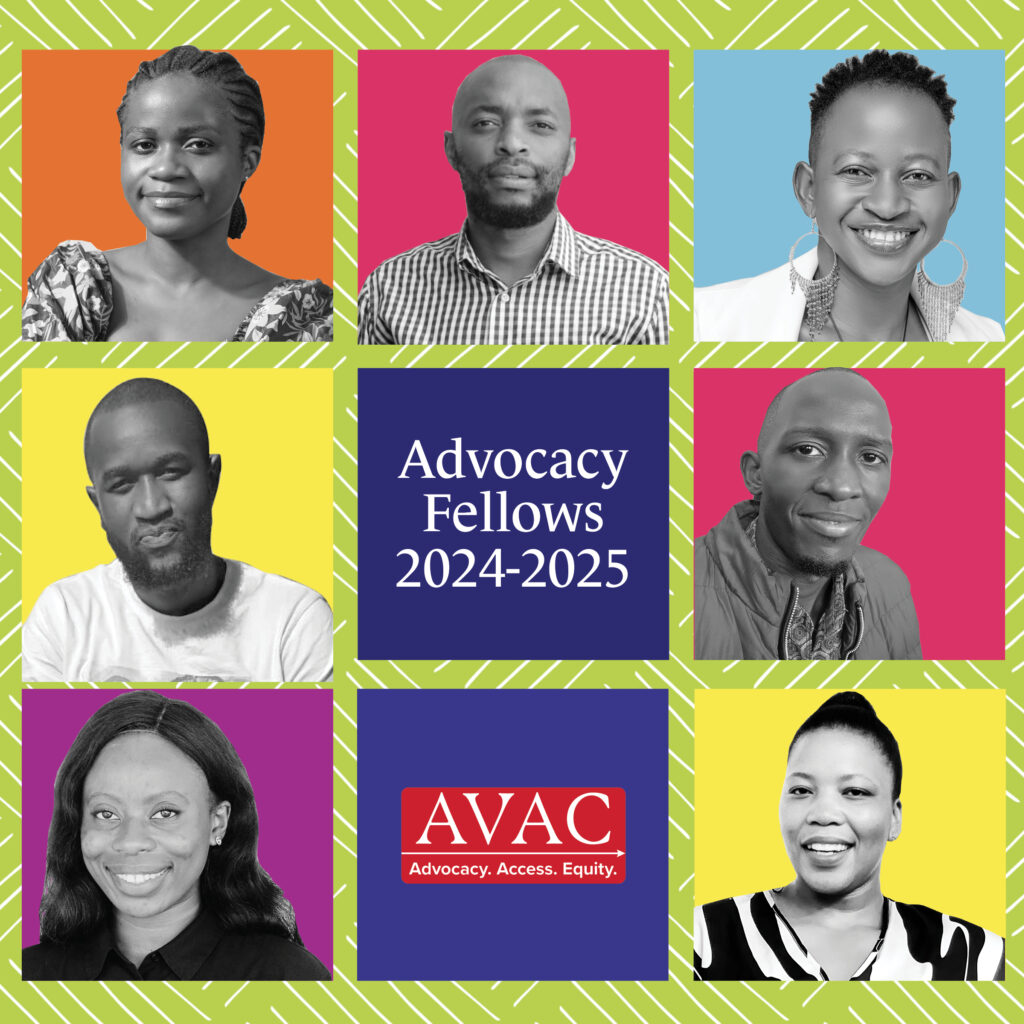
These Fellows were selected from a pool of 200+ applicants from seventeen countries to pursue evidence-based advocacy on a range of issues related to HIV prevention. The 2024/25 Advocacy Fellows and their host organizations include:
- Pamela Fuzile, Desmond Tutu Health Foundation, South Africa
- Samuel Anyula Gorigo, HOYMAS, Kenya
- Bahati Thomas Haule, DARE Organization, Tanzania
- Ezra Meme, We Rise and Prosper, Uganda
- Rhoda Msiska, Copper Rose Zambia, Zambia
- Elina Mwasinga, Coalition of Women Living with HIV and AIDS, Malawi
- Mokone Rantsoeleba, Phelisanang Bophelong HIV/AIDS Network, Lesotho
Congratulations to our new class of Fellows and thank you to all the applicants and their proposed host organizations for the time and effort put into the application process, and to the independent review committee of advocates, scientists and former Fellows and hosts who guided our decision-making.
About AVAC’s Advocacy Fellows Program
Achieving successful HIV prevention relies on programs and research shaped by communities and grounded by their needs and priorities. Skilled and informed community advocates drive this process. AVAC’s Advocacy Fellows Program expands and strengthens the capacity of civil society advocates and organizations to monitor, support and help shape HIV prevention research and rapid rollout of new effective interventions in low- and middle-income countries facing substantial HIV burdens.
The program provides intensive support to emerging and mid-career advocates to execute advocacy projects addressing locally identified gaps and priorities. Fellows receive comprehensive training, financial backing, and technical assistance to strategize and execute a targeted 18-month project hosted by an organization within their country.
In its 15-year history, nearly 100 advocates working with 70+ partner organizations across 15 countries have participated in the program. They have influenced policy, championed community perspectives, strengthened healthcare systems, demystified HIV prevention research, advocated for fairness and transparency on local, regional, and global scales and now lead many national and regional organizations. Discover more about the program’s impact here. And view video reflections from Alumni Fellows both here and here.
April Webinars!
This month we will host six webinars on a wide range of important issues, including choice in HIV prevention, PrEP in cisgender women, criminalization and HIV, syphilis in the US and DoxyPEP. Scroll down for what’s coming up later this week and later this month.
The More We Know: Evolving our understanding of PrEP for cisgender women
April 5, 9:00 – 10:30 am EST
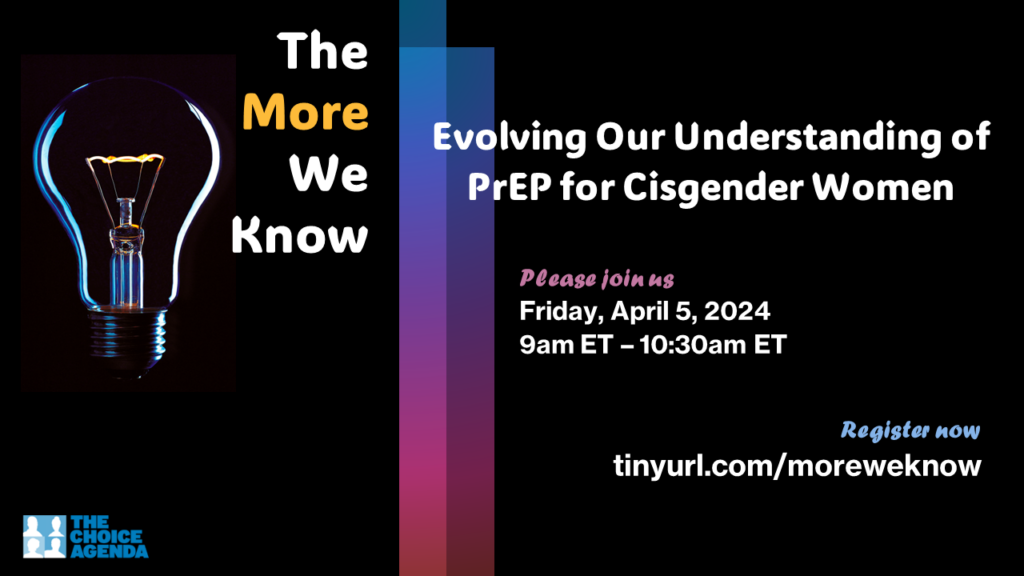
Science and real-world experience continue to demand a re-assessment of our collective understanding of the safety and effectiveness of PrEP options for women, including oral, vaginal ring, and injectable options. Join us, Jeanne Marrazzo of NIAID, Joyce Ng’ang’a of WACI Health and Raniyah Copeland of Equity & Impact Solutions for a conversation with The Choice Agenda.
Watching the Watcher: Intersections of surveillance and criminalization in HIV and reproductive health care
April 9, 10:00 – 11:30 am EST
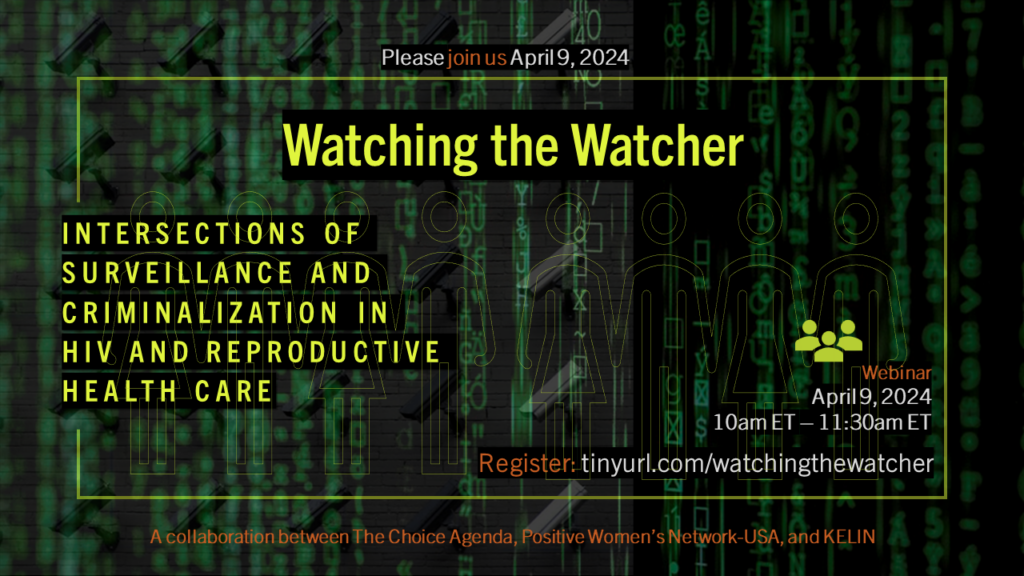
Positive Women’s Network-USA and The Choice Agenda invite you to join us for a webinar featuring leaders in digital technology, HIV advocacy, and abortion criminalization to examine the existential threat of our ongoing blurred boundaries between public health and policing.
STI Awareness Week is April 14 – 20!
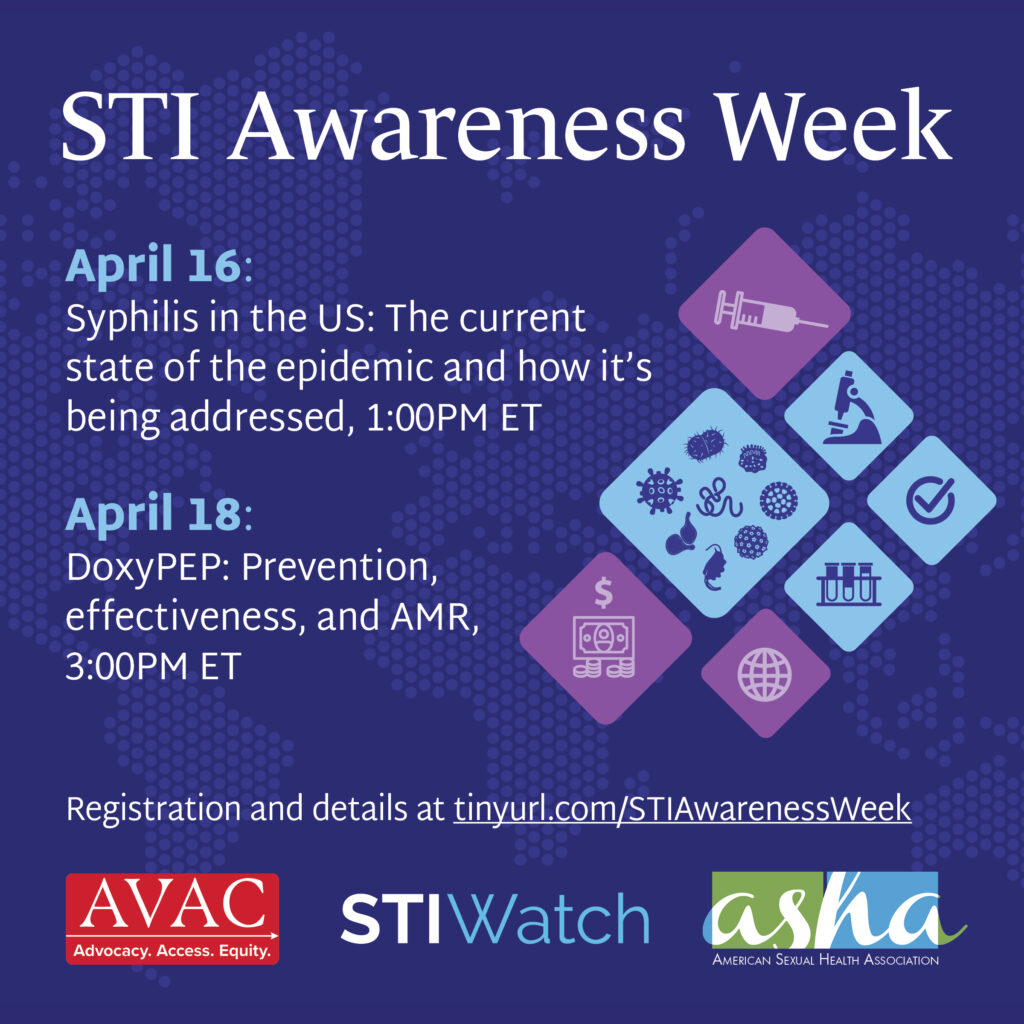
Join us for two webinars focused on syphilis and DoxyPEP. These webinars are intended for health care providers, civil society organizations, public health officials, and others working in the STI/HIV fields.
Discussing Early Results from the SEARCH Dynamic Choice Study
April 23, 10:00 – 11:30 am EST
Join AVAC and Professor Moses Kamya of Makerere University to find out why the early results of the SEARCH Dynamic Choice study were some of the most exciting to come out of CROI in 2024.
Conducted in Kenya and Uganda, the study offered oral PrEP, PEP or injectable cabotegravir to both men and women, and an option to switch products.
We Can’t End HIV in the United States Without Equitable PrEP Access: strategies for success
April 26, 1:00 – 2:30 pm EST
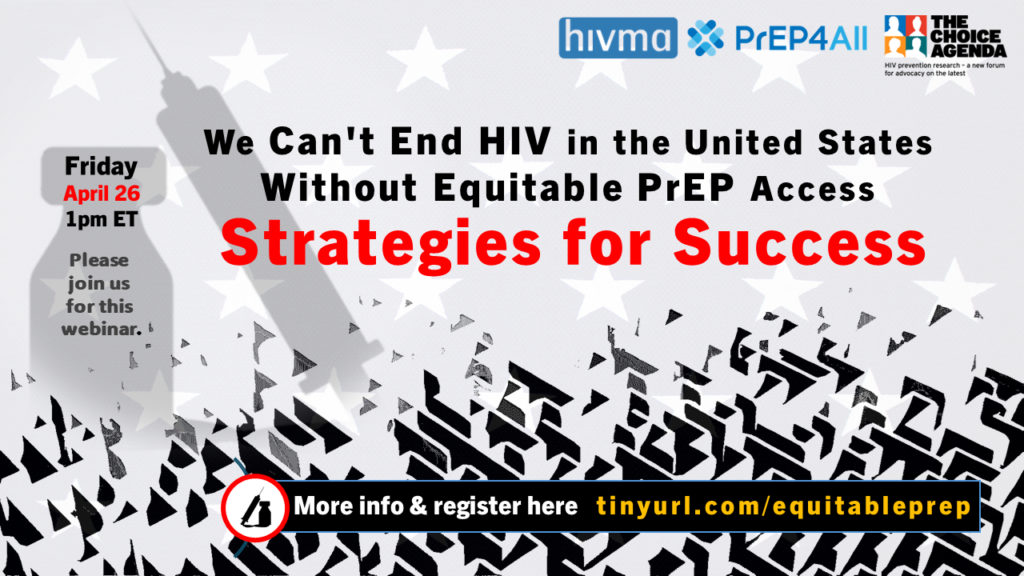
Join HIVMA, PrEP4All and The Choice Agenda, as we assess some of the key challenges to delivering PrEP in the United States equitably, including cost, the complexities of our health care system, and other factors that inhibit uptake amongst the most vulnerable communities. Strategies to address these challenges will be offered, with lots of time for QA, discussion and much-needed debate. Please join us!
Our Partnership Network
AVAC’s greatest strengths lie in its ability to convene diverse stakeholders in the fight against HIV and its dedication to bolstering civil society coalitions for effective advocacy.